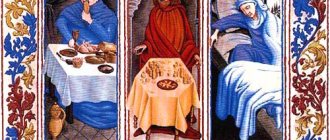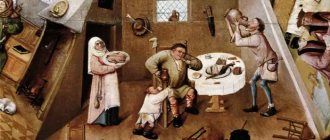"The Seven Deadly Sins and the Four Last Things." Fragment of a painting by the Dutch artist Hieronymus Bosch
Everyone has heard about mortal sins. They write books and make films about them. In them, these temptations are represented by powerful demons. Despite this, many believers do not have a clear understanding of what mortal sins are. What specific qualities and actions belong to them and is it possible to somehow defeat them?
How did the term come about?
The very concept of mortal sin is found in the writings of the Apostle John the Theologian:
“If anyone sees his brother sinning a sin that does not lead to death, let him pray, and God will give him life, that is, he who sins a sin that does not lead to death. There is a sin leading to death: I’m not talking about that, so that he prays.”
(1 John 5:16)
Many are amazed that there is no mention of the seven deadly sins in Scripture. They do not coincide with the Decalogue and are not opposed to the Beatitudes given by Jesus in the Sermon on the Mount.
Why "mortals"
Mortal sins are understood as those that lead to the death of the human soul. This is a state in which a person is completely deprived of moral sense and need for God. He merges so much with evil that repentance becomes impossible for him. Mortal sin is committed completely voluntarily and with full awareness that it is a direct violation of the will of God.
Theophan the Recluse writes:
“A mortal sin is one that robs a person of his moral and Christian life. If we know what moral life is, then defining mortal sin is not difficult. Christian life is zeal and strength to remain in communion with God by fulfilling His holy law.
Therefore, every sin that extinguishes jealousy, takes away strength and relaxes, distances one from God and deprives Him of grace, so that after it a person cannot look at God, but feels himself separated from Him; every such sin is a mortal sin...
Such a sin deprives a person of the grace received in baptism, takes away the Kingdom of Heaven and delivers it to judgment. And all this is confirmed in the hour of sin, although it is not accomplished visibly. Sins of this kind change the entire direction of a person’s activity and his very state and heart, forming, as it were, a new source in moral life; why do others determine that mortal sin is the one that changes the center of human activity?
For watermarks
Water signs are sensitive, receptive, deep, and imaginative. At the same time, they are biased, vulnerable, and subject to mood swings. Their main sins are despondency and laziness, as well as greed.
Cancer
This sign tends to give up and become despondent if something doesn’t go according to plan. Disappointment knocks him out of the saddle for a long time and plunges him into the abyss of apathy or soul-searching. One reason is too much attachment to desired ideas, people and goals.
For Cancer, they are so important that he regards any discrepancy with expectations as a blood offense (even if no one intended to offend). Forgive the world for imperfections and life will become much easier - energy, interest and new strength will appear.
Scorpion
This sign is subject to lust and greed - these are its only shortcomings, and if others arise, the roots are still here.
It would be more correct to call this vice lust—not even desire, but an enduring thirst. It can concern anything: power, money, recognition, sex, etc.
If Scorpio achieves what he wants, he is invariably disappointed, since his hunger is still not satisfied. He must realize the true needs - those that are in the highest spiritual sphere.
Fish
This sign is often attributed to laziness and despondency, the inability to cope with real problems and the habit of having one's head in the clouds. However, at the root of these apparent shortcomings is envy.
Pisces react painfully if other people are doing better than them: against the backdrop of other people's successes, their own failures seem catastrophic.
They will never show that they are jealous, but will suffer in silence, become sad, fall into apathy and melancholy. It is important for them to remember a simple rule: if someone managed to achieve something, then they certainly can too.
Story
The concept of the seven deadly sins appeared among monks even before the Orthodox Church separated from the Catholic Church. In the 4th century. A monk from Byzantium, Evagrius of Pontus, created the doctrine of 8 sinful thoughts that give rise to other thoughts.
Who proposed this classification
The theory of seven sins leading to the death of the soul was developed by Gregory Dvoeslov in 590 AD. Later, other theologians studied it. The final concept was defined by Thomas Aquinas in the 13th century.
Another theologian who contributed to the development of this topic was Peter Binsfeld . He believed that every mortal sin has its own demon, which is responsible for its spread in the human world.
Heavens of the Universe
For example, in the ancient treatise Poimander (book in PDF format), written in the 3rd century AD. it is said that after death, the visible material (physical) body of a person decomposes, and his spiritual body ascends through the seven lower spheres of the universe to the Eighth sphere. That is, to the sphere of the fixed stars, which is not under the control of the seven planetary geniuses who control the seven planets (wandering stars): the Moon, the Sun, Mercury, Venus, Mars, Jupiter and Saturn.
Geocentric picture of the Universe
However, not everyone is destined to reach the Eighth Sphere, or heaven, one of the three highest spheres of the universe. But only to those who possess intimate knowledge, i.e. gnosis (Greek γνώσις - “knowledge, cognition”). The treatise “Pimander” says this:
This is the ultimate benefit of those who possess knowledge* - to become gods.
* Gnostic philosophy lacks one of the basic concepts of Christianity - faith in God. Instead, the Knowledge of God is offered.
In the first centuries of our era, those chosen ones who possessed secret knowledge were called Gnostics, i.e. knowers, or knowers. It was to such people that the famous ancient expression was addressed:
Know yourself and you will know the gods and the Universe.
Compare this expression with the words of John 8:32:
“Know the truth, and the truth will set you free.”
Predecessors
Not only Christians, but also other philosophers thought about human vices and virtues. Thus, Aristotle's Nicomachean Ethics talks about several advantages or virtues. The philosopher believes that every positive property is a golden mean between two extreme states of the soul.
The Roman poet Horace also praised virtues and condemned vices. He wrote that the beginning of virtue is avoidance of vice.
Sins are talked about many times in the books of the Old Testament. Thus, Solomon wrote:
“These are six things that the Lord hates, even seven that are an abomination to His soul:
proud eyes, a lying tongue and hands that shed innocent blood,
a heart that forges evil plans, feet that quickly run to villainy,
a false witness who speaks lies and sows discord among brothers.”
(Prov.6:16-19)
The expression “six... even seven” may mean that Solomon is not giving a complete list of vices.
Brief description of each and spiritual essence
Pride
It can also be positive. In this case, we simply rejoice in our successes. But sinful pride makes a person exalt himself above others and feel like a little god. For him, family members are servants, friends are his retinue.
At the same time, for someone who suffers from arrogance, it is not so important what others think about him. Even the opinion of the one true God does not matter to him.
“Know clearly that a person who proudly lives virtuously - if this means living virtuously at all - can unexpectedly fall into final destruction. Anyone who has allowed himself to fall, having learned humility from this fall, can rise up and quickly restore his former position, if only he wants.
The one who apparently does good with pride, but does not tolerate any evil, will never even notice his lawlessness, but, on the contrary, will only multiply the evil and suddenly leave here, deprived of everything.
Pride is the beginning of sin. Every sin begins with it and finds its support in it.”
John Chrysostom
Envy
Envy is the dissatisfaction felt by comparing one's achievements with those of others. An envious person constantly regrets his place in the world, believing that he will find joy only when he surpasses or humiliates others.
- Useful material for a practicing Christian:
What is the sin of envy and effective ways to combat it
Anger
Anger is not always condemned in Scripture. It was righteous anger that prompted Christ to drive the dishonest merchants out of the temple. Christians, following their Teacher, hate sin, but continue to love people who fall under its influence.
But sinful anger forces a person to take justice into his own hands and take revenge on the offender by any means. At the same time, a person indulges in anger over any little thing and over time loses the ability to control himself. It is like a sleeping volcano that can explode at any moment, destroying all life around it.
- Practical advice:
How to deal with angry thoughts and words
Dejection
Anyone can feel depressed. It is impossible to imagine a living and feeling person who would constantly rejoice at life in a world full of pain and disappointment. How can you experience happiness when faced with crime, incurable disease or the death of loved ones? But sinful despondency prompts a person to abandon God as a source of hope.
Fornication
This is a general name for all sins associated with sexual relations outside of marriage. This includes:
- adultery;
- intimate relationships before marriage;
- homosexuality;
- bestiality and so on.
Many have a completely wrong idea about fornication. It is believed that if a man and a woman live together in a so-called civil marriage, remaining faithful to each other, then this is not a sin. However, the Bible states that only those relationships that are formalized by law are considered marriage.
"The Seven Deadly Sins and the Four Last Things" Lust. Fragment of a painting by the Dutch artist Hieronymus Bosch, 1475-1480 Oil on board. 120 × 150 cm
Greed (love of money)
The love of money is a sin that makes a person a slave to money and wealth. But even when the cherished dream comes true and the desired wealth becomes a reality, the victim of greed does not thank God for his success and does not engage in charity. Just the opposite, a money lover becomes stingy and greedy. There is never enough for the greedy, even if he becomes the richest man on earth.
Gluttony
Food is a gift from a loving God. Sin is its excessive use or gluttony. The Apostle Paul considered this a manifestation of idolatry:
“Their end is destruction, their god is their belly, and their glory is in shame, they think about earthly things.”
(Phil. 3:19)
Gluttony includes several sins:
- abuse of wine and other alcoholic beverages;
- inabstinence from heavy food during fasting;
- constant spending of exorbitant amounts on delicacies;
- excessive consumption of sweets.
For fire signs
Fire signs embody active, creative, active energy. They are brave, inspired and enterprising, but at the same time impulsive, unyielding, and aggressive. Their main vices are anger, vanity and lust.
Aries
Aries is impulsive and hot-tempered. Accordingly, this sign is characterized by anger. He easily loses his temper, loses control over his emotions, and later regrets it. It is important to be aware of this character trait and moderate aggression in a timely manner, not to bring it to an uncontrollable state.
a lion
This sign is prone to vanity and selfishness. He is endowed with many talents, which is why he is too fixated on himself. Such a Leo becomes susceptible to flattery, which allows cunning people to successfully manipulate him. It is important to acknowledge this shortcoming and not consider yourself superior to other people. A leader's strength increases with noble intentions and decreases with complacency.
Sagittarius
This sign is charged with lust and, to a certain extent, greed. Sexual relationships for Sagittarius are a gambling sport, hunting and obtaining trophies, the best way to assert oneself. Despite the psychological prerequisites, lust ceases to be a physiological dependence. A person becomes insatiable and demands more and more new experiences. He should observe moderation and satisfy his hunger not in the carnal, but in the spiritual realm.
How many passions are there and how do they differ from sins?
The Monk John Climacus said that passion is a vice that has merged with human nature itself. This happens under the influence of constantly committed sin, which builds its nest in the heart. As a result, a person does not need to be encouraged to sin. He himself strives for wickedness with irresistible force. In essence, it is slavery to sin.
Passion is also called a vicious desire that prompts a person to commit a number of sins. Thus, Saint Ignatius Brianchaninov compiled a list of 8 passions and those ungodly acts to which they encourage.
Let's take anger for example. It is followed by:
- revenge;
- rage;
- loss of reason in a fit of rage;
- constant screaming;
- an explosion of emotions;
- foul language;
- hatred;
- violence;
- murder;
- rancor;
- hostility;
- constant resentment;
- slander;
- condemnation.
The list of the main vicious passions almost completely coincides with the list of mortal sins. Sometimes constant sadness is added to passions.
Is there any fundamental difference between sins and passions?
Yes, I have. If sin is an action, then passion is the reason for its commission:
“...but everyone is tempted, being drawn away and enticed by his own lust;
lust, having conceived, gives birth to sin, and sin that is committed gives birth to death.”
(James 1:14,15)
Any sin committed once can be mortal if a person does not want to repent of it. Many people believe that if you commit fornication, abuse alcohol, use foul language and otherwise sin only occasionally, then this is not considered a sin. This puts a person on a slippery slope, where consciously committing wicked acts leads him to enmity with God.
Christian commandments and virtues
In the days of Moses, God gave the people of Israel the 10 Commandments and other laws. This was not the entire set of laws, but an elementary minimum designed to help a person not sink to the same level as animals. Most of the deadly sins are not mentioned among them. For the most part, they describe a course of action that is displeasing to God (a consequence of sinful passions), but not thoughts or feelings.
Interesting fact
The Law of Moses did not appear until several thousand years after the creation of Adam and at least 800 years after the Flood.
The commandments of Moses were given at a time when most people no longer understood the difference between love and lust, the desire for justice and unrighteous anger that leads to murder, personal desires and sin. Therefore, God indicated specifically what sin is.
However, spiritual infancy was to remain a thing of the past. Therefore, in the New Testament, priority is given not to commandments, but to virtues.
The Fall of the First People in Paradise
What are virtues?
Being virtuous means more than being kind. People leading a dissolute lifestyle also often come to the aid of the hungry, poor and sick. But only a holy servant of God can be virtuous.
“Beloved! I ask you, as strangers and strangers, to abstain from carnal lusts that attack the soul,
and to lead a virtuous life among the pagans, so that for the reasons for which they slander you as evildoers, when they see your good deeds, they may glorify God on the day of visitation.”
(1 Peter 2:11,12)
Peter contrasts virtue with carnal lusts. The important thing is that he points to the predominant importance of highly moral behavior of Christians in the preaching of the Gospel. Unfortunately, these days many are sure that the main thing is to be well-versed in dogmatic theology and be able to clearly explain the basics of Christian doctrine and easily quote the Fathers of the Church.
But what is the point of this knowledge if a believer commits fornication, insults dissenters, and behaves rudely and arrogantly? Holiness, humility and love, and not deep erudition, are the best proof that Christianity really transforms a person for the better.
Let's look at the difference between virtue and commandments using an example. A married man who only dreams of another woman does not actually violate the commandment “thou shalt not commit adultery.” But a virtuous husband will not cheat on his wife even in his thoughts.
Partial list of virtues:
“The fruit of the Spirit is love, joy, peace, long-suffering, kindness, goodness, faith,
meekness, abstinence. There is no law against them."
(Gal.5:22,23)
In total there are more than 30 Christian virtues.
Part 12. Pride
M. Vrubel. Demon defeated
"Lucifer's Sin"
We, people raised in Soviet times, were taught from childhood that pride is almost the main virtue of a Soviet person. Remember: “Man sounds proud”; “The Soviets have their own pride: they look down on the bourgeoisie.” And indeed, the basis of any rebellion is pride. Pride is the sin of Satan, the first passion that appeared in the world even before the creation of people. And the first revolutionary was Satan.
When the angelic world was created, the heavenly army, one of the highest and most powerful angels, Dennitsa, did not want to be in obedience and love for God. He became proud of his power and strength and desired to become like God himself. Dennitsa carried away many angels, and a war broke out in heaven. Archangel Michael and his angels fought with Satan and defeated the evil army. Satan-Lucifer fell like lightning from heaven to hell. And since then, the underworld, hell, is a place where dark spirits live, a place devoid of the light and grace of God.
A rebel revolutionary cannot help but be proud; he is the continuer of Lucifer’s work on earth.
Communism is a quasi-religion, and, like any creed, it has its own “creed” and its own commandments. Their “relics”, “icons”, banners – banners and religious processions – demonstrations. The Bolsheviks only intended to build heaven on earth, without God, and, of course, any thought about humility was considered ridiculous and absurd. What kind of humility is there when “we are ours, we will build a new world, whoever was nothing will become everything.”
However, God cannot be mocked, and history itself has passed its judgment on the Bolsheviks. It was not possible to build a paradise without God; proud plans were put to shame. But although communism fell, pride did not decrease, it just took on different forms. Talking to a modern person about humility is also very difficult. After all, a market capitalist society, aimed at success and career growth, is also based on pride.
Although you often hear in confession, when you ask a question about the sin of pride, and the answer is: “Whatever, I don’t have pride.” One woman writes to Saint Theophan the Recluse: “I spoke with my spiritual father and told him different things about myself. He told me straight out that I was proud and vain. I answered him that I am not proud at all, but I can’t stand humiliation and servility.” And this is what the saint answered her: “They sang the funeral service beautifully. Don’t let them offend you, so they know that they can’t grab you with their bare hands. See, you thought of calling it something, and to your face? Now I will sentence you: what is the best proof that you are proud, like your rebuke? She is not the fruit of humility. And why should you contradict such a sentence?.. It’s better for you, without contradicting, to take a good look at yourself to see if, in fact, there is this potion in you, which is extremely unkind.”
So, what is pride and how does this sin manifest itself? Let us turn again to Saint Ignatius (Brianchaninov): pride is “contempt for one’s neighbor. Preferring yourself to everyone. Insolence. Darkness, dullness of the mind and heart. Nailing them to the earthly. Hula. Disbelief. False mind. Disobedience to the law of God and the Church. Following your carnal will. Reading heretical, depraved, vain books. Disobedience to authorities. Caustic ridicule. Abandonment of Christ-like humility and silence. Loss of simplicity. Loss of love for God and neighbor. False philosophy. Heresy. Godlessness. Ignorance. Death of the soul."
Trial and conviction
Saint Cassian the Roman says about pride that although it is the last in the list of eight passions, “but from the beginning and time it is the first. This is the most ferocious and most indomitable beast."
Pride in the series of passions comes after vanity, which means it stems from this vice and has its beginning in it. “The flash of lightning foretells a thunderclap, and pride foretells the appearance of vanity,” instructs St. Neil of Sinai. The search for vain, vain glory, praise, inflated self-esteem gives rise to exaltation over people: “I am higher than them, more worthy; they are below me.” This is pride. Condemnation is also associated with this feeling. Why, if I am higher than everyone else, that means I am more righteous, everyone else is more sinful than me. Inflated self-esteem does not allow you to objectively judge yourself, but it helps you to be a judge of others.
Pride, starting with vanity, can reach the depths of hell, because this is the sin of Satan himself. None of the passions can grow to such limits as pride, and this is its main danger. But let's get back to condemnation. To condemn means to judge, to anticipate the judgment of God, to usurp His rights (this is also terrible pride!), for only the Lord, who knows the past, present and future of a person, can judge him. The Monk John of Savvaitsky tells the following: “Once a monk from a neighboring monastery came to me, and I asked him how the fathers lived. He answered: “Okay, according to your prayers.” Then I asked about the monk who did not enjoy a good reputation, and the guest told me: “He has not changed at all, father!” Hearing this, I exclaimed: “Bad!” And as soon as I said this, I immediately felt as if in delight and saw Jesus Christ crucified between two thieves. I was about to worship the Savior, when suddenly He turned to the approaching angels and said to them: “Take him out, this is the Antichrist, for he condemned his brother before My judgment.” And when, according to the word of the Lord, I was driven out, my robe was left at the door, and then I woke up. “Woe is me,” I then said to the brother who came, “this day is angry with me!” "Why is that?" - he asked. Then I told him about the vision and noticed that the mantle I left behind meant that I was deprived of God’s protection and help. And from that time I spent seven years wandering through the deserts, not eating bread, not going under shelter, not talking to people, until I saw my Lord, who returned my mantle,” says the Prologue.
That's how scary it is to make a judgment about a person. Grace departed from the ascetic only because he said about his brother’s behavior: “Bad!” How many times a day do we, in thoughts or words, give our merciless assessment of our neighbor! Each time forgetting the words of Christ: “Judge not, lest ye be judged” (Matthew 7:1)! At the same time, in our hearts, of course, we say to ourselves: “I would never do anything like that!” And very often the Lord, for our correction, in order to shame our pride and desire to condemn others, humbles us.
In Jerusalem there lived a virgin who spent six years in her cell, leading an ascetic life. She wore a hair shirt and renounced all earthly pleasures. But then the demon of vanity and pride aroused in her a desire to condemn other people. And the grace of God abandoned her for excessive pride, and she fell into fornication. This happened because she labored not out of love for God, but for show, for the sake of vain glory. When she became intoxicated by the demon of pride, the holy angel, the guardian of chastity, left her.
Very often the Lord allows us to fall into precisely those sins for which we condemn our neighbors.
Our assessments of our neighbor are very incomplete and subjective; we not only cannot look into his soul, but often we know nothing about him at all. Christ did not condemn obvious sinners, nor harlots, nor adulterers, because he knew that the earthly path of these people was not yet over, and they could take the path of correction and virtue. Only the trial after death brings the final line to everything that a person has done in life. We see how a person sins, but we do not know how he repents.
Once I returned from a cemetery, where I was invited to serve a memorial service, and the woman who called me asked me to bless her car. One of my friends was present at the consecration. When the woman drove off in the already blessed new foreign car, he said: “Yes, it’s not clear that she bothered very much to earn money for this car.” Then I told him that this woman had great grief, her son was killed not long ago... You can never judge the well-being of a person’s life by appearance.
Pride and division
In our time, there have appeared many “scoffers” (as the Apostle Jude calls them), who constantly find reasons to be indignant at the church hierarchy. The Patriarch, you see, communicates too much with the secular authorities, the bishops are all completely infected with money-grubbing and simony, the priests also think only about income and drive around in Mercedes. Special newspapers and websites have appeared that specialize in denouncing the episcopate. Apparently, it seems to them that now the very times have come when “the bishops will not even believe in the resurrection of Christ.” There seems to be a complete decline in piety and church life.
What motivates these people? Pride. Who gave them such a right to denounce bishops and priests, and what do these denunciations give? They only sow enmity, confusion and division in the hearts of Orthodox people, who, on the contrary, now need to unite.
There have been unworthy people among priests and bishops at all times, and not just in the 20th or 21st centuries. Let us turn to the “golden age” of Orthodoxy, the age of holiness and the flourishing of theology. The 4th century gave birth to such pillars of the Church as Saints Basil the Great, Gregory of Nyssa, Gregory the Theologian, Athanasius of Alexandria, John Chrysostom and many, many others. And here is what St. John Chrysostom writes about this “golden age”: “What could be more lawless when people who are worthless and filled with many vices receive honor for something for which they should not be allowed to cross the church threshold?.. Now the leaders of the Church suffer from sins ... The lawless ones, burdened with a thousand crimes, invaded the Church, tax farmers became abbots.” Many of the holy bishops of the 4th century, including St. John himself, were sent into exile by the “robber councils” of hierarchs, and some died in exile. But none of them ever called for split and division. I am sure that many thousands of people would follow the deposed saints if they wanted to create their own “alternative church.” But the holy men knew that the sin of schism and division cannot be washed away even by the blood of martyrdom.
This is not what modern denouncers do; they prefer schism to submission to the hierarchy; this immediately shows that they are driven by the same pride. It lies at the basis of any split. How many schismatic, catacomb churches are now appearing, calling themselves Orthodox! “True Orthodox Church”, “the truest Orthodox Church”, “the most, most true”, etc. And each of these false churches, out of pride, considers itself better, purer, holier than everyone else. The same passion of pride moved and is moving the Old Believers. They have fragmented into a huge number of Old Believer “churches”, rumors, agreements that have no communication with each other. As Saint Theophan the Recluse wrote: “Hundreds of stupid rumors and thousands of discordant agreements.” This is the path of all schismatics and heretics. By the way, the entire Old Believers are not based on love for the old rite, but on pride and a high opinion of their exclusivity and correctness and hatred of Patriarch Nikon and his followers - the Nikonians.
But let’s say a little more about the “scolders”; they should remember the words of St. Cyprian of Carthage: “To whom the Church is not a mother, God is not a Father.” The Church was, is and will be, despite the unworthiness of some hierarchs who have existed, as I have already said, in all centuries and times. God will judge them, not us. The Lord says, “Vengeance is mine, I will repay” (Rom. 12:19). And we can correct the Church with only one thing - our personal piety. After all, we are also the Church. “Save yourself, and thousands around you will be saved,” said St. Seraphim of Sarov. And he knew this from his own spiritual experience. These are the people who are the small leaven that leavens the whole dough. A small amount of yeast can raise a whole kettle. But, by the way, according to my own observations, “scolders” tend to have a hard time with personal piety and morality. But there is more than enough pride.
Seduction
One of the most terrible and difficult to cure types of pride is prelest .
Prelest means seduction. The devil deceives a person, taking the form of an angel of Light, saints, the Mother of God, and even Christ Himself. A deceived person is given the greatest spiritual experiences by Satan, he can perform feats, even miracles, but all this is captivity by demonic forces. And at the heart of this is pride. Man became proud of his spiritual labors and deeds, performed them out of vanity, pride, often for show, without humility, and thereby opened his soul to the action of hostile forces.
Saint Ignatius (Brianchaninov) in his “Fatherland” gives an example of what terrible consequences delusion can lead to: “They said about a certain brother who lived as a hermit in the desert and for many years was deceived by demons, thinking that they were angels. From time to time his father according to the flesh came to him. One day, a father, going to see his son, took an ax with him with the intention of chopping wood for himself on the way back. One of the demons, warning the coming of his father, appeared to his son and told him: “The devil is coming to you in the likeness of your father with the goal of killing you, he has an ax with him. You warn him, snatch the ax and kill him.” The father came, according to custom, and the son, grabbing an ax, struck him and killed him.” It is very difficult to bring someone who has fallen into delusion out of this state, but such cases have happened. As, for example, with the Monk Nikita of Kiev-Pechersk. Having fallen into delusion, he was able to predict some events and memorized the entire Old Testament. But after the intense prayer of the venerable Kiev-Pechersk elders, the demon left him. After that, he forgot everything he knew from books, and his fathers barely taught him to read and write.
Cases of demonic seduction still occur today. A young man studied with me at the seminary, who prayed and fasted very intensely, but, apparently, with the wrong, unhumble disposition of his soul. Students began to notice that he spent all day reading books. Everyone thought he was reading the Holy Fathers. It turned out that he was studying books on Islam and the occult. I stopped confessing and receiving communion. Unfortunately, he could not be brought out of this state, and he was soon expelled.
The sin of pride, sometimes starting with petty vanity and arrogance, can grow into a terrible spiritual illness. That is why the holy fathers called this passion the most dangerous and greatest of passions.
Swear with pride
How do you fight pride, contempt for your neighbors, and self-exaltation? What can be opposed to this passion?
The Holy Fathers teach that the opposite virtue to pride is love. The most useful
The greatest of passions is fought with the highest virtue.
How to acquire love for your neighbor?
As they say, it is easy to love all of humanity, but it is very difficult to love a specific person with all his shortcomings and weaknesses. When the Lord was asked: “What is the greatest commandment in the law?” He answered: “Thou shalt love the Lord thy God with all thy heart, and with all thy soul, and with all thy mind: this is the first and greatest commandment; the second is similar to it: love your neighbor as yourself” (Matthew 22: 37-39).
Love is a great feeling that unites us with God, for “God is love.” Love is the only happiness; it can help us overcome all difficulties and defeat pride and selfishness. But not everyone correctly understands what love is. The pleasant feelings we get when we are treated well are often mistaken for love, but this is not love. “If you love those who love you, what profit will it be to you? Don’t tax collectors do the same?” (Matt. 5:46). It is very easy and pleasant to love a person, to be near him when he only makes us happy. But when communication with our neighbor does not suit us in some way, we immediately change our attitude towards him, often to the diametrically opposite: “from love to hate there is one step.” But this means that we did not love real love, our love for our neighbor was consumerist. We liked the pleasant sensations that were associated with him, and when they disappeared, so did the love. It turns out that we loved a person as a thing we needed. Not even as a thing, but as a product, delicious food, because we still take care of our favorite thing, for example, we polish the body of our favorite car, regularly service it, buy all sorts of jewelry, etc. That is, even into a thing, if we love it, we put our care and attention. And we only love food for its taste, nothing more; once it is eaten, we no longer need it. So true love gives
, but does not require. And this is the real joy of love. The joy of receiving something is material, consumer joy, but in giving to someone it is true, eternal.
Love is service. Our Lord Jesus Christ Himself gives us a great example of this, when He washed the feet of the apostles at the Last Supper, saying: “So, if I, the Lord and Teacher, have washed your feet, then you should also wash one another’s feet. For I have given you an example, that you also should do the same as I have done to you” (John 13:14-15). And Christ loves us not for anything (because there is nothing special to love us for), but simply because we are His children. Even if they are sinful, disobedient, spiritually sick, it is the sick, weak child that parents love most.
The feeling of love cannot exist without our efforts. It needs to be nurtured in your heart, warmed up day after day. Love is a conscious decision: “I want to love.” And we need to do everything so that this feeling does not go away, otherwise our feeling will not last long, it will begin to depend on many random reasons: emotions, our mood, life circumstances, the behavior of our neighbor, etc. It is impossible to fulfill the words of Christ in any other way, because we are commanded to love not only for loved ones - parents, spouses, children, but also for all people. Love is acquired through daily work, but the reward for this work is great, for nothing on earth can be higher than this feeling. But in the beginning we have to literally force ourselves to love. For example, you came home tired, don’t wait for someone to please you, help yourself, wash, say, the dishes. If you're in a bad mood, force yourself, smile, say a kind word, don't take your irritation out on others. If you are offended by a person, you consider him wrong, you consider yourself innocent - force yourself, show love and be the first to reconcile. And pride is defeated. But here it is very important not to become proud of your “humility.” So, educating himself day after day, a person will someday reach the point where he will no longer be able to live differently: he will have an inner need to give his love, to share it.
A very important point in love is to see the value of every person, because there is something good in everyone, you just need to change your often biased attitude. Only by cultivating love for our neighbor in our hearts, changing our attitude towards him, learning to see the good sides in him, will we step by step overcome pride and exaltation in ourselves. Love conquers pride, for pride is a lack of love for God and people.
How to learn to love God? Having loved His creation - man. Man is the image of God, and it is impossible to love the Proto-Image and without love, to disrespect the icon, the image of God. It is not for nothing that the Apostle John the Theologian writes to us: “Whoever says: “I love God,” but hates his brother, is a liar: for he who does not love his brother whom he sees, how can he love God whom he does not see? And we have this commandment from Him, that whoever loves God should also love his brother” (1 John 4:20).
Instead of the conclusion: “The Kingdom of Heaven is taken by force”
The path of fighting passions is not easy and thorny, we often become exhausted, fall, suffer defeat, sometimes it seems that we have no more strength, but we get up again and begin to fight. Because this path is the only one for an Orthodox Christian. “No one can serve two masters: for either he will hate one and love the other; or he will be zealous for one and neglectful of the other” (Matthew 6:24). It is impossible to serve God and remain a slave to passions.
Of course, no serious business is done easily or quickly. Whether we are recreating a temple, building a house, raising a child, treating a seriously ill person, very great efforts are always required. “The kingdom of heaven is taken by force, and those who use force take it by force” (Matthew 11:12). And acquiring the Kingdom of Heaven is impossible without cleansing oneself from sins and passions. In the Slavic translation of the Gospel (always more accurate and figurative), instead of the verb “taken,” the word “needs” is used. And indeed, spiritual work requires not just effort, but coercion, compulsion, overcoming oneself.
A person who fights passions and overcomes them is crowned by the Lord for this. Once the Monk Seraphim of Sarov was asked: “Who in our monastery stands above all before God?” And the monk replied that he was a cook from the monastery kitchen, a former soldier by origin. The elder also said: “This cook’s character is naturally fiery. He is ready to kill a person in his passion, but his constant struggle within the soul attracts God's great favor to him. For the struggle, the gracious power of the Holy Spirit is given to him from above, for God’s word is immutable, which says: “To him who overcomes (himself), I will give a place to sit with Me and will clothe him in white robes.” And, on the contrary, if a person does not fight with himself, then he reaches a terrible bitterness, which leads to certain death and despair.”
A selection of advice from the holy fathers in the fight against sin
The Fathers of the Church paid great attention to the fight against sinful actions and thoughts. They left many valuable comments on this topic.
Rev. Anthony the Great:
“Evil clings to our nature like rust to copper or dirt to the body. But just as it was not the coppersmith who created the rust, and it was not the parents who created the dirt on their children, so it was not God who created the evil. He put conscience and reason into man so that he would avoid evil, knowing that it is harmful to him and leads to torment. Watch yourself carefully: when you see someone lucky in power and wealth, do not praise him under any circumstances. But immediately imagine death before you, and you will never wish for anything bad.”
The advice is to train the conscience and mind in the fight against vicious passions. The conscience can be made more sensitive by reflecting on the fact that sins grieve God and harm us and our neighbors. Reason allows you to imagine the consequences of sin even before it is committed. It is easy to guess that fornication leads to illness, family destruction and loneliness.
Macarius the Great:
“Humans are changeable by nature. Therefore, just as one who has fallen into the depths of vice and is enslaved by sins can turn to good, so one who is sealed by the Holy Spirit and filled with heavenly gifts is free to return to evil. Some who have tasted God's grace and become partakers of the Holy Spirit, when they lose caution and vigilance, become spiritually extinguished and become worse than they were before. This happens not because God changes or the grace of the Spirit fades away, but because people themselves lose grace and therefore become corrupted and fall into many evils.”
Macarius's idea is that anyone, even a very experienced Christian, can take the path of sin and lose his integrity. This happens when a person begins to hope for his own holiness and thinks that in rare cases he has the right to commit a small sin. Over time, the conscience transforms so much that the former saint turns into a sinner. This is exactly what happened to Solomon. Read more about Solomonic sin in the article by Viktor Glebov:
The Story of King Solomon: Biblical Facts and Popular Myths
Rev. Isaac the Syrian:
“When a person, remembering previous sins, punishes himself, then God looks at him with favor. God rejoices that man himself imposed punishment for deviating from His path - this serves as a sign of the sincerity of repentance. And the more a sinner forces himself, the more God’s favor towards him increases.”
You can punish yourself by depriving yourself of personal pleasures. For example, if someone has a problem with watching pornography, you can deprive yourself of the pleasures of watching movies and going online for a while. Some, in order to cleanse themselves from physical or moral defilement, go to remote places, deprived of the benefits of civilization, in order to be alone with God and his creation.
Avva Dorotheus:
“If anyone has even one passion that turns into a skill, it will torment him. Sometimes a person does many good deeds, but one evil skill can overcome them all. For example, if an eagle's claw gets tangled in the net, it will end up in captivity. Likewise, the soul, due to one passion, can fall into the hands of the enemy. Therefore, do not allow even one passion to turn into a habit, but pray to God day and night so as not to fall into temptation. If we find ourselves defeated due to our weakness, then we will force ourselves to immediately get up, we will begin to cry before the goodness of God, we will again watch and strive. And God, seeing our good aspiration, humility and contrition of heart, will give us a helping hand and work with us according to His mercy.”
Right John of Kronstadt:
“Watch your heart all your life and look closely at what prevents it from connecting with God. Let this be the science of sciences for you, and with God’s help you will learn to quickly notice what moves you away from God and what brings you closer to Him. The evil one tries very hard to come between our hearts and God. It is he who alienates us from God through various passions: the lust of the flesh, the lust of the eyes and the pride of life.”
“ The science of sciences is to conquer the passions operating within us. Great wisdom, for example, is not to be angry with anyone and not to think evil about anyone, even if someone has done us harm. Wisdom is to despise self-interest and love non-covetousness, despise delicacies and be content with simple food, eaten in moderation. Wisdom is not to flatter anyone, but to always speak the truth without fear; wisdom is not to be seduced by the beauty of the face, but to respect the beauty of the image of God in every person. Wisdom is to love your enemies and not take revenge on them in deed, word, or thought.
Wisdom is not to store up wealth for yourself, but to give alms to the poor in order to gain treasure in Heaven. Alas! We have almost studied all the sciences, but have not learned at all to avoid sin and, thus, often turn out to be complete ignoramuses in moral science. And it turns out that the truly wise were the saints, the disciples of the true Teacher-Christ, and we, the so-called scientists, are ignorant, and often, the more learned, the more ignorant, because we have not learned the most important thing, and are enslaved by various passions ».
Elder Nikon:
“If every word, deed and thought puts a stamp on us, then we must take all measures to preserve ourselves from everything harmful. Both Bishop Ignatius Brianchaninov and the holy fathers write that very often, almost always, we do not feel harm to ourselves from a harmful deed immediately after this harmful deed; this harm takes its toll after some time. The result is the fruit of the evil accepted into oneself, which makes itself felt in its various manifestations. Everyone can see this for themselves, reaping the bitter fruit of their mistakes and hobbies. Only those who do not pay attention to themselves and do not consider themselves, their mental and heartfelt states in the light of the Holy Gospel and the patristic writings, do not see and do not feel, in other words, they lead an absent-minded life. Often a harmful deed does not seem harmful. This is the enemy's deception. You should not trust yourself, your heart and reasoning. In deciding what is harmful and what is not harmful, one must be guided by the instructions of the Gospel Scripture and the statutes of the Orthodox Church and the Holy Fathers, as well as the advice of a spiritual father or elders who, from their experience and spiritual life, can give edification.”
Brief interpretation of God's commandments for children
The 10 commandments of God can be explained to children this way:
1. I am the Lord thy God: thou shalt have no other gods besides Me.
This means that there is only one God, and you must believe in Him with all your soul, love and obey Him more than anything in the world, just as you love and listen to your dad and mom. Let the Lord be the meaning of your whole life, control and reign in it. Don’t forget that God watches all your actions, desires and thoughts. Therefore, pray to Him that He will not allow you to sin.
2. Do not make idols for yourself, do not worship or serve them.
Do not worship false gods - idols, for example, pop, movie, and sports stars. Don't believe in astrology and that our destiny depends on the stars. Worship only the one and only God, although there are many idols on earth. Trust in God, not in people.
3. Do not take the name of the Lord your God in vain.
Always pronounce the name of God with attention and reverence in prayer or in pious conversations about God. When you say the word “Lord,” it’s like you pick up the phone and dial God’s number, and on the other end the Lord says to you, “I’m listening.” Therefore, do not disturb God in vain with empty conversations.
4. Work for six days and do all your work in them, and devote the seventh - the day of the holiday - to the Lord your God.
Study diligently at school for six days, do your homework at home and help your parents. It is also necessary to pray and fulfill the commandments on these days. But especially dedicate the seventh day, Sunday, to God: attend divine services and Sunday school, learn God’s wisdom. And with God you will always be happy and comforted.
5. Honor your father and your mother, so that it may go well with you and that your days on earth may be long.
Treat your dad and mom with respect, listen to them and help them. While you are little, your parents take care of you. And when you grow up and your parents grow old, then you will have to take care of them. If you do this, then the Lord promises you a happy and long life on earth. You also need to respect all elders.
6. Don't kill.
People can be killed not only with weapons, but with rude words and impudent behavior. Never offend your younger ones and try to protect those who are offended. Do not tease your comrades and do not give them nicknames, but call them by name. Be polite to all people. Don't hurt animals either.
7. Do not commit adultery.
While you are little, be a faithful and devoted friend, help a friend in trouble. Don't betray or abandon your friend in trouble. And when you grow up and get married, be faithful to your soul mate, do not betray your love. Ask God for help to maintain the purity of your heart.
8. Don't steal.
Don't take other people's things without permission. The one who took something from people in a dishonest way, that person became a thief, this will become known to everyone. Even if not right away, not now, but everyone will know this secret, God will show it to the whole world, He will clearly reward for the deception.
If you are given an item (for example, a book) for a while, give it back on time. If you find something on the street, try to find the owner of the thing and write an announcement about the find. If you find a phone number, call someone in your contacts and report it. Take care of your honor from a young age!
9. Do not lie, do not bear false witness.
Sometimes you may think that lying will help you avoid punishment or trouble. But sooner or later any deception will be revealed and the secret will become clear. If you lie, you will lose the trust of your loved ones and God's mercy. Don’t be afraid to tell the truth in any case so that your conscience doesn’t torment you.
It is also prohibited to slander and defame innocent people. Try to see in your neighbors not bad qualities, but kind and good ones. To do this, ask for God's help.
10. Do not covet anything that your neighbor has.
God bestows each person in his own way: some with wealth, some with strength or wisdom, and others with other talents. Do not envy the talents of others, but seek and develop your own talents and be grateful to God for them. Rejoice not only in what you have, but also in what your neighbor has, and you will be happy.
What is confession
- Features of women's confession: a complete list of sins (list)
Committed sin brings a person into a state of enmity with God. In order to restore relationships, confession is needed. During this sacrament, the Christian tells the priest about his offense and, as the Orthodox Church teaches, the sinner receives the Lord's forgiveness through him.
Confession is a bathhouse for cleansing the soul of vice.
You need to prepare for confession. If a believer wants to receive healing, and not just formally go through the sacrament, he must be honest with God, the priest and himself. Even before the conversation, you need to remember the sins committed by words, thoughts, emotions or actions.
Sacrament of Repentance in the temple
This is very important, since effective treatment of the disease begins with a correct diagnosis. It is important to show humility during confession. You need to admit your guilt, and not shift responsibility for your mistakes to others.
- What to tell before the lectern?
Strong repentance: sins in confession for men
Good and evil "teachers"
The thinker, theologian and poet Dante Alighieri, who lived in the 14th century, in the second part of the book entitled “Purgatory” of his famous Divine Comedy, also describes the seven circles of which purgatory consists. The idea of purgatory was mentioned by the ancient Greek philosopher Plato. Thus, the solar system is a kind of purgatory, in which, like in a forced labor colony, there are “prodigal sons of God.”
And in this colony, the overseers - 7 planetary geniuses of the Solar System - look after the “prodigal sons” who are on planet Earth. If in the genitura (astrological birth chart) one of the 7 planets is well located, then the planetary genius controlling it will give the native those positive living conditions for which he is responsible according to astrological teaching.
And if the planet is poorly located, then the situation will be the opposite. This planetary genius will unleash all its evil on a person in one area of life or another, especially if the planet is considered harmful in astrology.
However, it happens that a very good position of a planet, considered beneficial in astrology, promises the native excessive “happiness”, which will be a test for him - whether he will be able to use it for its intended purpose, i.e. for your spiritual growth, and not for material prosperity and a carefree life here on planet Earth.
Often people are afraid of the vicissitudes of Fate, so they consider themselves unhappy if a poorly located malefic planet “poisons” life. They have no idea that the “evil” planetary genius thus becomes the best, but harsh teacher, whose lessons will be of spiritual benefit in the current incarnation. After all, without well-learned lessons, it will be impossible to pass the “exam of life.”
Deadly sins in works of art
- The mortal sins are mentioned in the second book of Dante's Divine Comedy. At the very bottom of purgatory were sinners who suffered from envy and pride during their lives.
- One of the poets of Shakespeare's era, Edmund Spenser, depicts the House of Pride in his book The Faerie Queene. His mistress was Lucifer, whose advisers were seven vices that were destructive to the soul.
- A series of prints by Pieter Bruegel the Elder depicts sins and their devastating consequences.
- After World War II, Paul Cadmus, a painter from the United States, painted horrific “portraits” of each of the seven vices in a separate painting.
- But in the works of Marta Dahling, a Polish artist, all the deadly sins are depicted in the form of attractive young women dressed in luxurious multi-colored dresses. It is noteworthy that not one of them even has a slight joyful smile.
So, mortal sins are a terrifying reality of the modern world. Nowadays, largely thanks to modern technologies, their spread has become a pandemic. Now Christians are not persecuted for their faith, since the right to religious beliefs is protected by law. However, in conditions of tolerance for sin, it is more difficult for many to maintain integrity than, perhaps, even during times of terrible persecution, when fear of publicity and fear of shame prevented them from sinning.
Everyone needs to create their own spiritual and moral fortress. It is built day by day from the small spiritual bricks of our thoughts, feelings and actions. It is very important not to fight this battle blindly, pleasing God, but not understanding the wisdom of his commandments. Conscience and reason need to be trained. Accurate knowledge is needed.
If God hates fornication, greed, love of money and other vices, you need to find out what is destructive and bad in them. Then God's desires, commandments and views will become part of our personality. It is also important to realize that mortal sins deprive us of not only eternal life. This awaits all the wicked in the future. But now our friendship with God, family happiness, health of soul and body, as well as the integrity of our soul are at stake.
Victor Glebov










